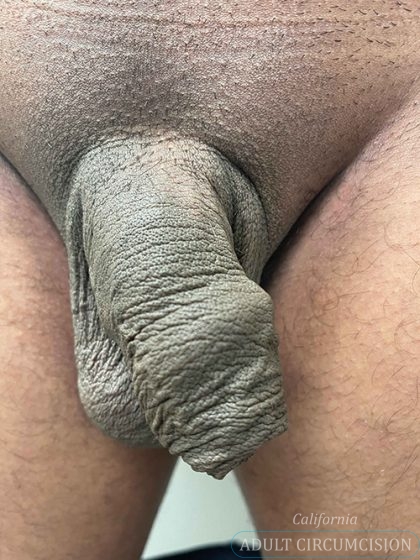Adult circumcision under local anesthesia is a safer alternative to the use of general anesthesia, which can come with various risks and downsides. Whether your reasons for the procedure are purely for aesthetics, or you have struggled with medical conditions related to your foreskin, local anesthesia makes for a much simpler procedure and an easier recovery. As a highly personal procedure, circumcision is customizable to suit your exact cosmetic desires and needs. The best procedural practices serve to preserve penile sensation and promote an aesthetic outcome that works to boost a man’s confidence.
If you have been considering the prospect of adult circumcision, discuss your concerns with Dr. Mo Bidair, a board-certified urologist with years of experience in research endeavors within his fields of study. Those struggling with feelings of self-consciousness or discomfort with the most intimate area of their body can rest assured that Dr. Bidair will treat them with professionalism and compassion in mind. Dr. Bidair does not perform a “one-size-fits-all” circumcision procedure; instead, he uses precise techniques that consider individuals’ unique anatomy and their cosmetic and functional expectations.
To take the first step today, call California Adult Circumcision in La Mesa– a suburb of San Diego– at (619) 486-5005 or use his contact form, and a staff member will help you schedule your consultation appointment.
Contents
Before and After Photos
About General Anesthesia
For those who undergo any surgical procedure, the concept of general anesthesia can seem appealing. It can be a peaceful experience- patients simply drift into “deep sleep” within a few minutes. However, the process and the effects on the body are intense and can leave you with more lasting consequences.
General anesthesia works by interfering with the nervous system, blocking the brain and body from sending and perceiving nerve impulses to each other. Not only that, but the effects of the medication will prevent the brain from recollecting anything from the surgery itself. For this type of anesthesia, a specially trained anesthesiologist must monitor patients’ vital signs before, during, and after the procedure. Usually, many other professionals are involved in ensuring that respiration, internal temperature, and blood pressure remain stable.
Anesthesiologists begin by injecting the patient’s arm vein to connect them to an IV line with some of the necessary anesthetic. They may also give them a gas to inhale through a facial mask. Within just a couple of minutes, patients can expect to fall asleep. After this occurs, the anesthesiologist inserts a flexible breathing tube into the trachea to administer oxygen. This tube is necessary to protect the airway and lungs from oral mucus or digestive fluids. This tube is always removed before patients awaken from their medication-induced sleep.
When is General Anesthesia Appropriate?
General anesthesia is only recommended in limited circumstances where the surgery may:
- Take a significant amount of time
- Require that the patient take muscle relaxants
- Cause significant bleeding
- Cause changes in patient respiration, blood pressure, or heart rate
Outside of these cases, surgeons strive to find other means of anesthetizing their patients since general anesthesia can be risky for some individuals. In general, older adults and younger children are more likely to experience confusion from its neurotoxic effects. (1) Pneumonia and cardiac events can also occur after surgery. Surgeons are careful to weigh out the risks and evaluate if another method of anesthetizing is better. Some risk factors include:
- Regular smoking
- Drug or alcohol use
- Sleep apnea
- High blood pressure
- Obesity
- Chronic conditions that affect the heart, kidney, lung, or liver
- Medicine allergies
Side Effects
Upon waking up from general anesthesia, many healthy individuals experience uncomfortable side effects, even if the procedure went exactly as planned. The consequences of such intensive medication can result in:
- Grogginess and confusion
- Excessive sleepiness
- Dry mouth
- Nausea and vomiting
- Sore throat and hoarseness
- Shivering
- Dizziness
- Blurred vision
- Muscle aches
An extremely rare, but possible occurrence is a phenomenon called anesthesia awareness, in which patients stay somewhat aware of the procedure, resulting in psychological distress long after the surgery is finished.
The Benefits of Circumcision with Local Anesthesia
Local anesthesia is most appropriate when the surgery is limited to a smaller area of the body. With this method, you can stay completely awake and aware while still attaining full numbness for the duration of the procedure. Benefits include:
- Reduced costs. More intensive procedures require a more expensive combination of medications used in general anesthesia. Local anesthesia only requires a few injections of one medication and is much more cost-effective.
- Outpatient procedure. It takes time to set up and administer general anesthesia, and it usually takes 1 to 2 hours to completely wake up from it. Surgeons must monitor patients afterward. In contrast, local anesthesia works instantly, and you can go home immediately after the procedure.
- Minor and unlikely side effects. Side effects like muscle twitching, headache, dizziness, and continued numbness are rare and minor side effects.
- No fasting is required. For a circumcision with local anesthesia, you do not have to prepare by fasting before the surgery. There is no risk of aspiration pneumonia, unlike general anesthesia.
- Faster recovery. Without managing the intensive effects of general anesthesia, your body will focus on the healing process. Within a few hours, local anesthesia wears off, and you will be able to walk around lightly and increase blood circulation, helping to facilitate a speedier recovery.
Why Consider Adult Circumcision?
Dr. Bidair will ensure you have the full scope of the pros and cons of circumcision to help you determine if the procedure is right for you. Still, the highlights of this minimally invasive surgery have intrigued many prospective patients who come to Dr. Bidair to learn more:
- Circumcision can lower your risk of developing inflammation of the glans (the head of the penis)- a condition called balanitis – by 68%. (2) With the removal of some or all of the foreskin, you can completely prevent balanoposthitis, a condition in which both the glans and foreskin are inflamed.
- Circumcised males have a decreased risk of contracting certain STIs. (3)
- Circumcision improves hygiene and significantly reduces the risk of fungal/bacterial infections and associated UTIs.
- You can effectively reduce your risk of penile cancer. (4)
- An exposed glans can look more aesthetically pleasing to partners and will not take away from your own sexual enjoyment.
- You can reduce your risk of developing pearly penile papules (PPPs) that can appear to be unsightly warts just under the glans. Since it is not an STD, Dr. Bidair can remove PPPs using a precise laser that vaporizes them without damaging the penile tissues.
- Dr. Bidair can customize your procedure to preserve some of the foreskin, or he can create a tighter, more defined look. Procedure options include high and tight circumcision, low and tight circumcision, high and loose circumcision, and low and loose circumcision.
- Circumcision can give men a way to completely express and feel aligned with their religious beliefs.
Personal Consultation
Dr. Bidair will make every effort to ensure that your consultation experience is comfortable, thorough, and informative. During your consultation with Dr. Bidair, you will be able to express your thoughts on circumcision and any recurrent medical issues you may be dealing with regarding your foreskin. He will briefly evaluate your medical history to ensure you can safely undergo the procedure. Dr. Bidair only utilizes local anesthesia for circumcision, making it much safer and more accessible for a wider variety of patients. During this first meeting, you will also be able to inquire about the different techniques Dr. Bidair uses and decide which one may work best for you.
Cost of Adult Circumcision in San Diego
While circumcision is an incredibly common procedure, you deserve to benefit from the safest and latest techniques that will get you back to your daily routine and sexual intimacy as soon as possible. The cost of your circumcision will mostly rely on the surgical technique applied, any recovery medications Dr. Bidair may prescribe, follow-up appointments, and other related surgical fees. We will inform you of the total cost estimate at the time of your consultation after fully evaluating these factors.
To inquire about an appointment or to ask any questions on Dr. Bidair’s approach to circumcision, call California Adult Circumcision in La Mesa at (619) 486-5005, or fill out our contact form to get in touch today. Dr. Bidair’s staff will set up a date and time that aligns with your schedule.
FAQ
What kinds of medical conditions can a circumcision treat?
An adult circumcision can treat phimosis, a condition in which the foreskin is unable to retract over the glans. It can also help prevent inflammation of the glans and foreskin. By removing the foreskin, men can better maintain their hygiene and prevent fungal infections and the likelihood of UTIs. Men with a short frenulum that causes pain can also benefit from a similar procedure called a frenulectomy.
When can I have sex after a circumcision?
Men should refrain from any sexual activity for at least 2 to 4 weeks post-procedure. As you begin sexual activity again, you should continue to use a condom to allow the scar to heal.
How long does a circumcision take?
A quality adult circumcision should take anywhere from an hour to an hour and a half.
Does circumcision under local anesthesia hurt?
During a circumcision performed under local anesthesia, patients typically experience minimal if any discomfort. The use of local anesthesia ensures that the area is completely numbed. While some patients may feel a slight sensation or pressure during the surgery, it is always very well-tolerated. If a patient is anxious about getting local anesthesia, we offer an injection prior to the procedure to make the patient more comfortable and to alleviate his anxiety.
References
- Regier BA, Rondeau B. Anesthetic Neurotoxicity. PubMed. Published 2023. https://www.ncbi.nlm.nih.gov/books/NBK573081/#:~:text=General%20anesthetics%20act%20on%20several
- Wray AA, Velasquez J, Khetarpal S. Balanitis. PubMed. Published 2021. https://www.ncbi.nlm.nih.gov/books/NBK537143/#:~:text=Balanitis%20is%20an%20inflammation%20of%20the%20glans%20penis%20
- Marfatia Y, Mehta K, Jain A, Shah D, Baxi D. Male circumcision and Sexually transmitted Infections – An update. Indian Journal of Sexually Transmitted Diseases and AIDS. 2021;42(1):1. doi:https://doi.org/10.4103/ijstd.ijstd_20_21
- Ornellas AA, Ornellas P. Should routine neonatal circumcision be a police to prevent penile cancer? | Opinion: Yes. International braz j urol. 2017;43(1):7-9. doi:https://doi.org/10.1590/s1677-5538.ibju.2017.01.03










